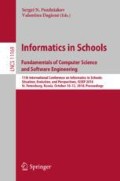Abstract
The Bebras contest started as a small computer-science competition in Eastern Europe and is now well-established all around the world. In the meantime, the challenge also addresses primary school students; in Germany since 2015. In the light of the ongoing discussion on introducing computer science in primary education, the question of whether the tasks differ between the age groups moved to the focus. So, we analyzed how Bebras tasks look like, especially comparing the different age of the participants. Here, only characteristics of the task descriptions are examined, showing that both, text and pictures differ through the age groups. Their complexity increases and also, addressed objects and subjects manifest a clear separation of Piaget’s stage of cognitive development between primary school and secondary school students. All the findings enable to concisely characterize Bebras tasks for their use in regular computer-science classes or for further research on the cognitive processes involved in solving those tasks.
Access this chapter
Tax calculation will be finalised at checkout
Purchases are for personal use only
References
Sabitzer, B., Antonitsch, P.K., Pasterk, S.: Informatics concepts for primary education: preparing children for computational thinking. In: Proceedings of the 9th Workshop in Primary and Secondary Computing Education, pp. 108–111. ACM, New York (2014)
Falloon, G.: Building computational thinking through programming in K-6 education: a New Zealand experience. In: Gómez Chova, L., López Martínez, A., Candel Torres, I. (eds.) EduLearn15 Proceedings, pp. 882–892. IATED Academy, Valencia (2015)
Yadav, A., Hong, H., Stephenson, C.: Computational thinking for all: pedagogical approaches to embedding 21st century problem solving in K-12 classrooms. TechTrends 60(6), 565–568 (2016)
Bell, T., Duncan, C., Atlas, J.: Teacher feedback on delivering computational thinking in primary school (2016)
Dagien, V., Stupurien, G., Vinikien, L.: Promoting inclusive informatics education through the Bebras challenge to all K-12 students. In: Rachev, B., Smrikarov, A. (eds.) Proceedings of the 17th International Conference on Computer Systems and Technologies 2016, CompSysTech 2016, pp. 407–414. ACM Press, New York (2016)
Dagiene, V., Stupuriene, G.: Bebras - a sustainable community building model for the concept based learning of informatics and computational thinking. Inform. Educ. 15(1), 25–44 (2016)
Tomcsányiová, M., Tomcsányi, P.: Little beaver – a new bebras contest category for children aged 8–9. In: Kalaš, I., Mittermeir, R.T. (eds.) ISSEP 2011. LNCS, vol. 7013, pp. 201–212. Springer, Heidelberg (2011). https://doi.org/10.1007/978-3-642-24722-4_18
Lister, R.: Concrete and other neo-piagetian forms of reasoning in the novice programmer. In: Proceedings of the Thirteenth Australasian Computing Education Conference - Volume 114, ACE 2011, pp. 9–18. Australian Computer Society, Inc., Darlinghurst (2011)
Gluga, R., Kay, J., Lister, R., Teague, D.: On the reliability of classifying programming tasks using a neo-piagetian theory of cognitive development. In: Clear, A., Sanders, K., Simon, B. (eds.) ICER 2012, pp. 31–38. ACM, Auckland University of Technology, Auckland (2012)
Szabo, C., Falkner, K., Falkner, N.: Experiences in course design using neo-piagetian theory. In: Simon, Kinnunen, P., (eds.) The 14th Koli Calling International Conference, pp. 81–90 (2014)
Piaget, J.: Science of Education and the Psychology of the Child. Orion Press, New York (1970)
Morra, S., Gobbo, C.: Cognitive Development: Neo-Piagetian Perspectives. Lawrence Erlbaum Associates, New York (2007)
Dagiene, V.: Information technology contests: introduction to computer science in an attractive way. Inform. Educ. 5(1), 37–46 (2006)
Dagienė, V., Futschek, G.: Bebras international contest on informatics and computer literacy: criteria for good tasks. In: Mittermeir, R.T., Sysło, M.M. (eds.) ISSEP 2008. LNCS, vol. 5090, pp. 19–30. Springer, Heidelberg (2008). https://doi.org/10.1007/978-3-540-69924-8_2
Tomcsányiová, M., Kabátová, M.: Categorization of pictures in tasks of the Bebras contest. In: Diethelm, I., Mittermeir, R.T. (eds.) ISSEP 2013. LNCS, vol. 7780, pp. 184–195. Springer, Heidelberg (2013). https://doi.org/10.1007/978-3-642-36617-8_16
Carney, R.N., Levin, J.R.: Pictorial illustrations still improve students’ learning from text. Educ. Psychol. Rev. 14(1), 5–26 (2002)
Hubwieser, P., Hubwieser, E., Graswald, D.: How to attract the girls: gender-specific performance and motivation in the Bebras challenge. In: Brodnik, A., Tort, F. (eds.) ISSEP 2016. LNCS, vol. 9973, pp. 40–52. Springer, Cham (2016). https://doi.org/10.1007/978-3-319-46747-4_4
Keller, J.M.: Motivational Design for Learning and Performance. Springer, Boston (2010)
Ruf, A., Berges, M., Hubwieser, P.: Types of assignments for novice programmers. In: Proceedings of the 8th Workshop in Primary and Secondary Computing Education, pp. 43–44. ACM, New York (2013)
Ruf, A., Berges, M., Hubwieser, P.: Classification of programming tasks according to required skills and knowledge representation. In: Brodnik, A., Vahrenhold, J. (eds.) ISSEP 2015. LNCS, vol. 9378, pp. 57–68. Springer, Cham (2015). https://doi.org/10.1007/978-3-319-25396-1_6
Mayring, P.: Qualitative Content Analysis. Basic Procedures and Software Solution. Social Science Open Access Repository. Theoretical Foundation, Klagenfurt (2014)
Mayring, P.: Qualitative content analysis. Forum Qual. Sozialforschung/Forum: Qual. Soc. Res. 1(2), 1–10 (2000). Qualitative methods in various disciplines i: psychology
von Eye, A.: An alternative to cohen’s k. Eur. Psychol. 11(1), 12–24 (2006)
Merrill, M.D., Twitchell, D.: Instructional Design Theory. Educational Technology Publications, Englewood Cliffs (1994)
Sweller, J.: Cognitive load during problem solving: effects on learning. Cogn. Sci. 12(2), 257–285 (1988)
Chandler, P., Sweller, J.: Cognitive load theory and the format of instruction. Cogn. Instr. 8(4), 293–332 (1991)
Author information
Authors and Affiliations
Corresponding author
Editor information
Editors and Affiliations
Rights and permissions
Copyright information
© 2018 Springer Nature Switzerland AG
About this paper
Cite this paper
Lutz, C., Berges, M., Hafemann, J., Sticha, C. (2018). Piaget’s Cognitive Development in Bebras Tasks - A Descriptive Analysis by Age Groups. In: Pozdniakov, S., Dagienė, V. (eds) Informatics in Schools. Fundamentals of Computer Science and Software Engineering. ISSEP 2018. Lecture Notes in Computer Science(), vol 11169. Springer, Cham. https://doi.org/10.1007/978-3-030-02750-6_20
Download citation
DOI: https://doi.org/10.1007/978-3-030-02750-6_20
Published:
Publisher Name: Springer, Cham
Print ISBN: 978-3-030-02749-0
Online ISBN: 978-3-030-02750-6
eBook Packages: Computer ScienceComputer Science (R0)

